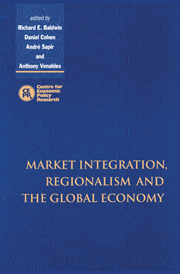Book contents
- Frontmatter
- Contents
- List of figures
- List of tables
- Preface
- Acknowledgements
- List of conference participants
- 1 Introduction
- PART ONE REGIONALISM AND THE GLOBAL ECONOMY
- 2 Regionalism vs. multilateralism
- Discussion
- 3 Preferential agreements and the multilateral trading system
- Discussion
- 4 Politics and trade policy
- Discussion
- 5 Globalisation and labour, or: if globalisation is a bowl of cherries, why are there so many glum faces around the table?
- Discussion
- 6 Openness and wage inequality in developing countries: the Latin American challenge to East Asian conventional wisdom
- Discussion
- PART TWO MARKET INTEGRATION AND REGIONALISM
- Index
6 - Openness and wage inequality in developing countries: the Latin American challenge to East Asian conventional wisdom
Published online by Cambridge University Press: 24 February 2010
- Frontmatter
- Contents
- List of figures
- List of tables
- Preface
- Acknowledgements
- List of conference participants
- 1 Introduction
- PART ONE REGIONALISM AND THE GLOBAL ECONOMY
- 2 Regionalism vs. multilateralism
- Discussion
- 3 Preferential agreements and the multilateral trading system
- Discussion
- 4 Politics and trade policy
- Discussion
- 5 Globalisation and labour, or: if globalisation is a bowl of cherries, why are there so many glum faces around the table?
- Discussion
- 6 Openness and wage inequality in developing countries: the Latin American challenge to East Asian conventional wisdom
- Discussion
- PART TWO MARKET INTEGRATION AND REGIONALISM
- Index
Summary
Greater openness to trade in developing countries is conventionally argued to be doubly blessed. It not only increases efficiency, but also reduces inequality, by boosting the relative demand for unskilled workers and hence narrowing the gap in wages (and in unemployment rates) between them and skilled workers. However, this optimistic view has been challenged by the experience of Latin America since the mid-1980s, where greater openness to trade has been accompanied by rising rather than falling wage inequality.
This chapter is a response to that challenge. Section 1 outlines the theory underlying the conventional wisdom; section 2 provides an overview of the empirical evidence, both in favour of and against it. Sections 3 and 4 attempt to resolve the conflict of evidence, the first in terms of differences between East Asia and Latin America, the second in terms of differences between the 1960s and the 1980s. Section 5 sums up.
Heckscher–Ohlin theory
The belief that increased openness reduces wage inequality in developing countries rests on an apparently unchallengeable fact – that the supply of unskilled labour, relative to skilled labour, is larger in developing than in developed countries (Wood, 1994, table 3.1) – and on an often challenged but widely used theory of trade, that of Heckscher and Ohlin (hereafter H–O).
The simplest model
H–O theory asserts that countries export goods which use intensively those factors of production with which they are relatively abundantly endowed, and import goods which use intensively factors which are relatively scarce at home.
- Type
- Chapter
- Information
- Market Integration, Regionalism and the Global Economy , pp. 153 - 181Publisher: Cambridge University PressPrint publication year: 1999
- 19
- Cited by



